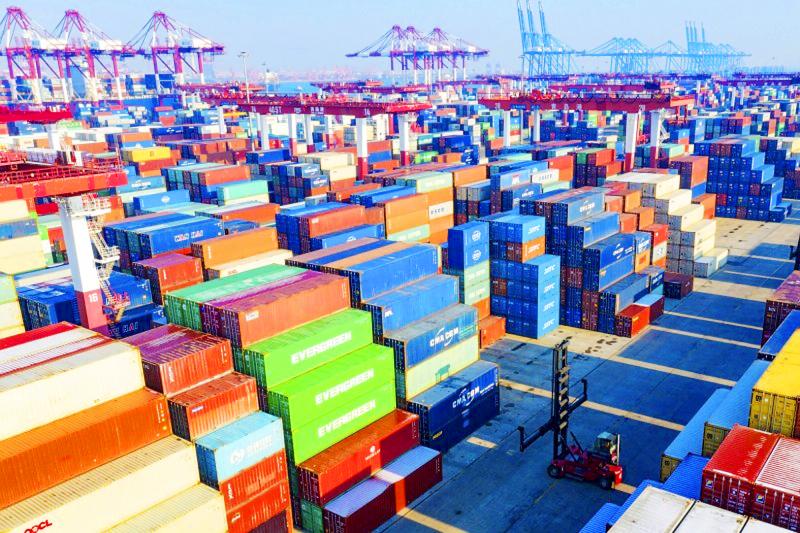Taiwan’s exports last month clocked another 12 percent upturn from a year earlier to a record US$33 billion, as 5G smartphones and other new technology applications ramped up business for local component suppliers, the Ministry of Finance (MOF) said yesterday.
The growth momentum might gather further strength this month with increases from 19 percent to 23 percent, aided by three more working days in January this year compared with last year, the ministry said.
“The factors driving the growth look sustainable and the timing of the Lunar New Year holiday will also lend support,” Department of Statistics Director-General Beatrice Tsai (蔡美娜) told a news conference in Taipei.

Photo: Wu Chi-lun, Taipei Times
Demand for 5G communication, high-performance chips, as well as remote-working and education devices remain high, Tsai said, adding that iPhone 12 sales proved stronger than expected.
Taiwan is home to suppliers of chips, camera lenses, casing, touch panels, battery packs and assemblers to Apple Inc.
Meanwhile, strong demand for laptops, servers, and other information and communication technology (ICT) products showed no sign of receding as COVID-19 infections spike around the world, Tsai said.
Electronics exports soared 22.2 percent to US$12.76 billion, while shipments of ICT products gained 17.6 percent to US$4.77 billion, jointly contributing about 50 percent to overall exports, ministry data showed.
Optical products, mainly flat panels, posted the fastest advance of 27 percent year-on-year, Tsai said.
Demand for non-technology products also showed a healthy recovery — with shipments of plastic, chemical and base metal products gaining 2 percent to 15.5 percent, the ministry said, adding that mineral and textile products continued to buck the trend, slumping up to 52.4 percent year-on-year.
Import data showed a positive cyclical movement for the second straight month, even though the increase tapered to 0.9 percent, giving Taiwan a large trade surplus of US$5.76 billion that has more than doubled year-on-year, Tsai said.
Imports of capital equipment dropped 6.4 percent due to the timing of equipment arrivals, she said.
Exports rose 11.7 percent year-on-year to US$97.21 billion last quarter, stronger than the November forecast of 7.8 percent by the Directorate-General of Budget, Accounting and Statistics, Tsai said.
For the whole of last year, outbound shipments hit a record high of US$345.28 billion, representing a 4.9 percent increase from a year earlier, outperforming rivals around the world, Tsai said.
Imports grew a mild 3.2 percent to US$78.72 billion last quarter, allowing for a slim gain for the whole year of 0.3 percent to US$286.49 billion, she said.

South Korea’s equity benchmark yesterday crossed a new milestone just a month after surpassing the once-unthinkable 5,000 mark as surging global memory demand powers the country’s biggest chipmakers. The KOSPI advanced as much as 2.6 percent to a record 6,123, with Samsung Electronics Co and SK Hynix Inc each gaining more than 2 percent. With the benchmark now up 45 percent this year, South Korea’s stock market capitalization has also moved past France’s, following last month’s overtaking of Germany’s. Long overlooked by foreign funds, despite being undervalued, South Korean stocks have now emerged as clear winners in the global market. The so-called “artificial intelligence

‘SEISMIC SHIFT’: The researcher forecast there would be about 1.1 billion mobile shipments this year, down from 1.26 billion the prior year and erasing years of gains The global smartphone market is expected to contract 12.9 percent this year due to the unprecedented memorychip shortage, marking “a crisis like no other,” researcher International Data Corp (IDC) said. The new forecast, a dramatic revision down from earlier estimates, gives the latest accounting of the ongoing memory crunch that is affecting every corner of the electronics industry. The demand for advanced memory to power artificial intelligence (AI) tasks has drained global supply until well into next year and jeopardizes the business model of many smartphone makers. IDC forecast about 1.1 billion mobile shipments this year, down from 1.26 billion the prior

People stand in a Pokemon store in Tokyo on Thursday. One of the world highest-grossing franchises is celebrated its 30th anniversary yesterday.

Chinese artificial intelligence (AI) start-up DeepSeek’s (深度求索) latest AI model, set to be released as soon as next week, was trained on Nvidia Corp’s most advanced AI chip, the Blackwell, a senior official of US President Donald Trump’s administration said on Monday, in what could represent a violation of US export controls. The US believes DeepSeek will remove the technical indicators that might reveal its use of American AI chips, the official said, adding that the Blackwells are likely clustered at its data center in Inner Mongolia, an autonomous region of China. The person declined to say how the US government received